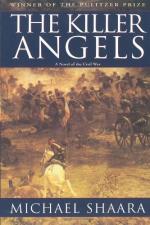
|
| Name: _________________________ | Period: ___________________ |
This test consists of 5 multiple choice questions, 5 short answer questions, and 10 short essay questions.
Multiple Choice Questions
1. What does Pitzer tell Chamberlain about Meade?
(a) He is resigning his position.
(b) He is the bravest man Pitzer had ever seen.
(c) He is issuing new orders.
(d) He had wanted to retreat.
2. What does Chamberlain think will happen if the South wins?
(a) America will become two countries.
(b) The South will eventually overtake the North.
(c) The South will become a British protectorate.
(d) The North and South will eventually reunify.
3. Now that nearly half of his regiment is gone, what does Rice tell Chamberlain to do?
(a) Move his remaining men out of harm's way for the time being.
(b) Take care of the wounded.
(c) Occupy the big, wooded hill.
(d) Join his men to Sickles' regiment.
4. What action does Chamberlain take that haunts him afterward?
(a) He leaves Kilrain wounded on the battlefield.
(b) He sends his men to scavenge ammunition from the dead.
(c) He sends Tom into a gap to fill it.
(d) He shoots an enemy officer at point-blank range.
5. What strange action does Chamberlain take under gunfire?
(a) He falls asleep.
(b) He charges on horseback, alone.
(c) He runs to the rear.
(d) He sends Tom to the front line.
Short Answer Questions
1. How does Lee generally handle a battle?
2. What is Stuart's initial response when Lee tells him there are officers who want Stuart court-martialed?
3. The song "Kathleen Mavourneen" remind Armistead of ___________.
4. What is Armistead's fear at the end?
5. What is the outcome of Lee's discussion with Longstreet?
Short Essay Questions
1. In "Friday, July 3, 1863, Chapter 2, Longstreet," compare and contrast Pickett's anticipation of battle with Longstreet's.
2. In "Friday, July 3, 1863, Chapter 1, Chamberlain," what does Tom say about the bayonets?
3. Earlier, in "The First Day, Chapter 4, Chamberlain," Chamberlain remembers Ames saying that to lead men, "You must care for your men's welfare. You must show physical courage." Do you think Chamberlain exemplifies these qualities? Explain, including reference to "Thursday, July 2, 1863, The Second Day, Chapter 4, Chamberlain,".
4. In "Thursday, July 2, 1863, The Second Day, Chapter 5, Longstreet," Longstreet several times has the urge to talk to Lee about his tactics, and about Stuart, and yet he suppresses the urge. Why? Do you think that is the right thing to do?
5. In "Friday, July 3, 1863, Chapter 1, Chamberlain," what is ironic about where Chamberlain and his men are being sent?
6. In "Thursday, July 2, 1863, The Second Day, Chapter 3, Longstreet," what difficulty arises for Longstreet that results in the attack not being effective?
7. In "Friday, July 3,1863, Chapter 5, Longstreet," why does Longstreet think he can no longer lead? How does Lee respond?
8. In "Thursday, July 2, 1863, The Second Day, Chapter 2, Chamberlain," what does Chamberlain's encounter with the escaped slave reveal to him?
9. In "Thursday, July 2, 1863, The Second Day, Chapter 2, Chamberlain," what does Kilrain think the war is about?
10. In "Thursday, July 2, 1863, The Second Day, Chapter 4, Chamberlain," what is the result of Vincent telling Chamberlain that his men cannot withdraw under any circumstances?
|
This section contains 1,235 words (approx. 5 pages at 300 words per page) |

|




